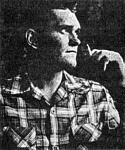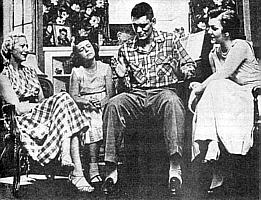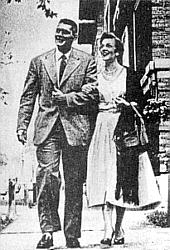
You've got to keep trying -
Dick York of This Is Nora Drake was almost a "has-been" at the age of 20.
By Jane King

Dick York of This Is Nora Drake was almost a "has-been" at the age of 20.
By Jane King
In 1950, Richard York came East, to the big city. He'd been acting in Chicago for ten years, since he was a little kid, but he might as well have hailed from Podunk, with the grass still in his ears. In New York, they don't care about out-of-town credits; half the time, they think you made 'em up.
Dick moved into a YMCA, then batted round for six months.
"You audition for anybody and everybody that'll hear you, and every day is a little worse, until you get discouraged and almost sick-" Dick can still remember.
Now, in - 1953, he's arrived; he's prominent in daytime dramas, such as This Is Nora Drake and Rosemary, he's opening soon in a Broadway play-but, while he loves his work, you can't sell him the phony idea of its glamour. To Dick it's a serious business, even when you're successful. "You do your show, take your check-and go home and wait for the phone to ring. And always you keep on trying-"
He's got two words of advice for all young hopefuls who want to come to New York and make fortunes in radio. "Stay home" are the words. Unless you know somebody, or have money. Knowing somebody and having money, you may still break your heart.

To him, a job's a job, and the best thing is finishing up, and going home at night to "a wife who loves you, a beautiful baby, a couple of rooms you can call your own."
With most of his rough times, professionally and personally, behind him, Dick's learning to relax a little. If somebody doesn't hire him today, he no longer takes it personally, or feels his work is bad.
It's taken him a long time to,get to this stage, because-aside from talent-he has none of the usual equipment you expect in an actor. In a world where it's okay to slit your competitor's throat (just so you don't get blood on the rug), he's an anachronism. He has old-fashioned ideas of honor. In a world where guys let their hair grow long and wavy, and call everybody "darling," and make entrances (even at the orange juice stand), you wonder what this boy's doing. He has a gentleness that seems bred in the bone, he speaks softly to waitresses, he helps women across streets, his hair's crew-cut, his humor's slightly cynical. He's an old twenty-five, having been a performer for fifteen years.
Dick York was born September 4, 1928, in Fort Wayne, Indiana. When he was five, the family moved to Chicago. Dick went to St. Mary of the Lake grammar school, and, at the age of nine, started working with the Jack and Jill Players. His first role was a fish, in Water Babies.
Bernard and Betty York, watching their butterball of a little boy (he weighed about a hundred-forty-five pounds then), may have had no idea that the whole thing wasn't just fun and games to Dick . . . but Dick knew. From the moment that he first walked-or, rather, swam-onstage, his fate was decided. He was an actor.
He went to De Paul Academy, and later studied drama at De Paul University, but he was working in radio all during his school days. He and a boy named Art Young were the two most used juvenile actors in Chicago, and one director out there kept getting them mixed up. He insisted on calling them Art York and Dick Young.
Art and Dick would meet in the hall of a radio station and compare notes. "I was on a show for So-and-So the other night," Art would say, "and I'm sure he meant you. It was comedy, not my kind of thing-"
Or Dick, who did mostly funny roles, would arrive for rehearsal and find he had a straight part. "Are you sure I was supposed to be here?" he'd ask the director. A doubtful look would cross the man's face. "Oh, ah, yeah, you're doing fine -"
In 1944, Dick got his first big break. He starred in a radio series called That Brewster Boy. Two years later, the show was finished.
"I was supposed to be on my way," Dick said to his parents, discouraged. "So now where am I?"
"Washed up," said his mother. "With your gray hair and wrinkles, you'll never get another chance -"
He was grinning sheepishly when the phone rang. A man on the other end was offering him the role of Billy on the Jack Armstrong show. "Well, I was thinking of going to New York," Dick said grandly. "Well, just until you go," said the man.
Six years later, Dick was still playing Billy. Right up until Jack Armstrong went off the air. Dick recalls a fluff he made on one show that had co-workers, engineers and listening audience convulsed with helpless laughter. The line he was supposed to read went, "We'd better get Jack out of there; he'll be eaten by the alligators." It came out, "We'd better get Jack out of there; he's eating all the alligators."

Which reminds Dick of- the time he bought his mother a bird that probably could have eaten alligators. He saw a parakeet in a store window, and it was a handsome creature, but when he got it home, it started acting ornery. "We'll mate her," Mrs. York said. "Maybe that'll improve her disposition."
They got a male parakeet, put him in the cage with La Belle Dame, and she nearly murdered him. Pulled out all his tail feathers, and howled with glee. She attacked several other potential mates until she finally got one she could halfway tolerate. Safely mated, she proceeded to lay an egg, but then wouldn't sit on it. She made the male bird do that! The Yorks were confounded. "If we take the male out, she'll feel more motherly toward the egg."
The male was removed from the cage, whereupon the female, a murderess to the end, calmly ate the egg.
The Yorks traded her in, not long afterward. There was no romance in her soul.
And, speaking of romance, let's get back to our boy.
Dick had started, while still in high school, going with a girl named Joan Alt. She was an actress, too. He met her on the Jack Armstrong show, when she came in to do the commercial. "She was so good, I decided to buy the product-" .
They'd talk about getting married, eyes full of dreams, and the moon coming up over Lake Michigan, and the world their oyster.
Then Jack Armstrong folded. And suddenly there simply wasn't any work for Dick in Chicago.
"I guess New York is the place," he said to Joan. She looked at him. "Something will come up-" "No," he said, "Joey, I have to go after it."
In the end, they agreed that he'd go first, get set in a job, send for her.
At which point the nightmare began for Dick. The Y, and the endless auditioning, and at the end of six months nothing but a one-shot appearance on Helen Trent, delivering a telegram, or some such thing - he doesn't really remember. He only got that because Ernie Ricca, a good friend, was directing it. Dick figures he never would have broken into New York radio at all if Ernie hadn't personally taken him around, kind of getting him started. "And I'd been in radio ten years, working steadily," he says, wonder in his voice.
Those were the scared days, the sick days. A few jobs started coming in, after the Helen Trent bit broke the ice, but Dick still wasn't really making time. One year of his being in New York, and Joan's being in Chicago, and he said the heck with it. He called her. "Come here," he said. "And we'll take our chances. I want to get married-"
They'd been waiting for four years; it seemed long enough.
Joan came East, they straightened out various complications, and on November 17, 1951, they were married.

Their first apartment was a surprise for Joan. Dick had taken a place on 51st Street and Second Avenue; he'd painted it, furnished it, got it all ready. But he'd told Joan he couldn't find a thing; they were going to have to stay with friends in New Jersey. That's what he told her.
If she was disappointed, she didn't show it. She'd have stayed with friends on the moon, if he'd asked her to.
The wedding over, he said he had a little present. Some friends had loaned them an apartment in New York as a sort of honeymoon place, for two weeks. He took her home. And after she'd inspected every stick in the establishment, and said she was crazy about it, he told her it was hers.
So she sat down and bawled for an hour. "You're not supposed to cry," he said. "Shut up," said his wife, sniffling happily.
That was a Sunday. On Monday, he had to report for work, and he's scarcely stopped working since. Currently, he's Russ McClure, the young romantic who is the boy friend of Grace Sargent on This Is Nora Drake, and he's been a no-good car thief on Rosemary.
Dick and Joan have an eight-month-old daughter named Kimberly Ann, whom they recently took back to Chicago to visit both their families. Dick's only sister, Vicki Ann, is nine years old, and the baby's only aunt, so she, Vicki Ann, took the visit very big. Carried the baby around, called on all the neighbors, discussed care and feeding with anyone who'd listen.
Dick, looking at Vicki Ann, who's also an actress (she's done bits on the Roy Rogers and Don McNeill shows), got a funny feeling - as though, in her, he saw himself again. Vicki'd start playing music on the phonograph, and it was the same old stuff he used to play when he was nine. John McCormack, It's a Long Way to Tipperary, The Shannon Four . . . Vicki's five feet tall already, and weighs ninety pounds, and people come along, say, "My, how you've grown, you're so plump and cute," and she withers. "She doesn't want to be plump and cute," Dick says, remembering his own problems with roundness. "She doesn't want to be the biggest girl in her class. It's funny how you always want to be right in the middle - "
Kimberly Ann ("I don't know where Joey got the name," says Joey's husband) has brown eyes, and looks like both parents. This is partly because her parents closely resemble each other, though Joan has blue eyes, Dick has brown.
The young Yorks live in Kew Gardens now, and Joan's chief problem is how she's ever going to see Dick, once Tea and Sympathy opens. Tea and Sympathy is the Broadway show he's to be featured in, and he got his part in a roundabout way. He'd played an insane banjo player in a Michael Shayne show - the Michael Shayne writer was excited by what Dick had done with the part - and, when Tea and Sympathy was casting, he, the writer, sent Dick to an agent who could send him to Elia Kazan, who was directing the play. Kazan hired Dick.
"It's not the part in the play," Dick tells you hastily. "A boy named Kerr, who was voted the best young actor of the year for his work in Bernadine, is the star - "
Dick thinks it will be good for him to work in the theatre. But - "It's a real blast for Joey," he goes on. "I'll be gone from ten in the morning till one the next morning every day - "
A friend, watching him grab lunch at about four o'clock one afternoon, in between his radio hours and a Tea and Sympathy rehearsal, asked if the pace weren't killing.
Dick stirred his coffee, shrugged. "Work's work," he said. "You gotta take it while it's there. After all, you've got to keep trying."